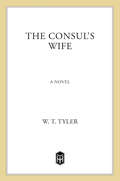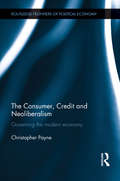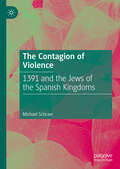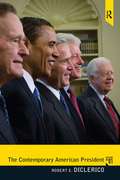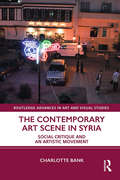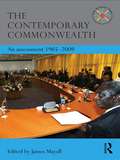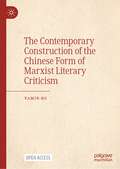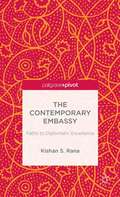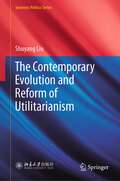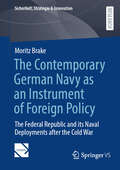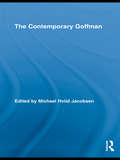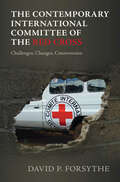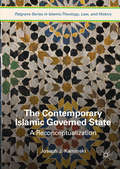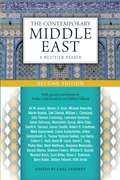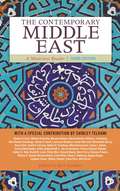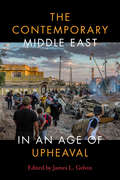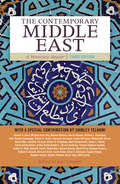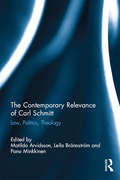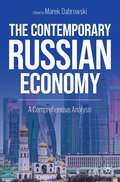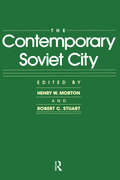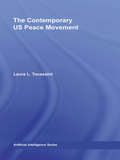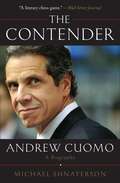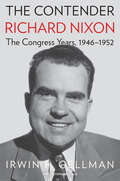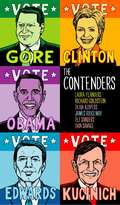- Table View
- List View
The Consul's Wife: A Novel
by W. T. TylerIn The Consul's Wife, W.T. Tyler returns once more to Africa, specifically to the Congo, where his protagonist, Hugh Mathews, a young foreign service officer, must cope with his embassy's ineptitude and its shallow-thinking bureaucrats even as he comes to terms with the confusion of feuding tribes and rebel factions living in the timeless and all but impenetrable wilderness surrounding the capital. Featuring a huge cast of characters - petty dictators, CIA operatives, a sorcerer who can summon lightning from the sky - and set during the era of America's increasing involvement in Vietnam half a world away, The Consul's Wife is also a love story of great power and resonance.
The Consumer, Credit and Neoliberalism: Governing the Modern Economy (Routledge Frontiers Of Political Economy Ser. #152)
by Christopher PayneThis book is an investigation into the economic policy formulation and practice of neoliberalism in Britain from the 1950s through to the financial crisis and economic downturn that began in 2007-8. It demonstrates that influential economists, such as F.A. Hayek and Milton Friedman, authors at key British think tanks such as the Institute of Economic Affairs and the Centre for Policy Studies, and important political figures of the Thatcher and New Labour governments shared a similar conception of the consumer. For neoliberals, the idea that consumers were weak in the face of businesses and large corporations was almost offensive. Instead, consumers were imagined to be sovereign agents in the economy, whose consumption decisions played a central role in the construction of their human capital and in the enabling of their aspirations. Consumption, just like production, came to be viewed as an enterprising and entrepreneurial activity. Consequently, from the early 1980s until the present day, it was felt necessary that banks should have the freedom to meet the borrowing needs of consumers. Credit rationing would be a thing of the past. Just like businesses, consumers and households could use debt to expand their stock of personal assets. By utilizing the method of French philosopher Michel Foucault this book provides an original analysis of the policy ideas and political speeches of key figures in the New Right, in government and at the Bank of England. And it addresses the key question as to why policy-makers both in Britain and the United States did little or nothing to stem rising consumer and household indebtedness, instead always choosing to see increasing house prices and homeownership as a positive to be encouraged.
The Contagion of Violence: 1391 and the Jews of the Spanish Kingdoms
by Michael SchraerThis book explores the causes, progression and consequences of the extraordinary spread of anti-Jewish violence and mass conversion across five separate Spanish polities in 1391, from Seville to the Pyrenees, overwhelming Valencia, Barcelona and numerous other locations. Using comparative analysis with previous outbreaks in Spain and elsewhere, it demonstrates the uniqueness of these events in terms of the speed and extent of transmission of attacks, and their lasting consequences. It argues that models of social contagion best explain this pandemic violence, in which latent hostilities, fears and uncertainties in the post-Black Death world, national and local tensions, were almost spontaneously triggered into often annihilatory riots by rapid communication and movement of people, spreading ideas, news, gossip and rumour through a variety of social networks. It seeks to demonstrate the modes by which polemic and tropes were translated into action, by local preachers, poetry, troubadours and the visual arts.
The Contemporary American President
by Robert E DiclericoDebuting in its first edition , The Contemporary American President explores the potential and limitations of presidential influence in times of rising public expectation for the office and the declining ability of presidents to meet it. It focuses on six major areas concerning the presidency - selection, power, accountability, decision making, personality, and leadership - and offers an appreciation of the challenges of the office as the institution attempts to function in an increasingly controversial political environment.
The Contemporary Art Scene in Syria: Social Critique and an Artistic Movement (Routledge Advances in Art and Visual Studies)
by Charlotte BankThis book focuses on the expanding contemporary art scene in Syria, particularly Damascus, during the first decade of the twenty-first century. The decade was characterized by a high degree of experimentation as young artists began to work with artistic media that were new in Syria, such as video, installation and performance art. They were rethinking the role of artists in society and looking for ways to reach audiences in a more direct manner and address socio-cultural and socio-political issues. The Contemporary Art Scene in Syria will be of interest to scholars of global and Middle Eastern art studies, and also to scholars interested in the recent social and cultural history of Syria and the wider Middle East.
The Contemporary Commonwealth: An Assessment 1965-2009
by James MayallThis collection of essays has been assembled to mark the centenary of The Round Table. It provides an analysis of the modern Commonwealth since the establishment of the Secretariat in 1965. Providing an overview of the contemporary Commonwealth, this book places the organization in its rich historical context while assessing its achievements, failures and prospects. The volume is divided into two parts: • Part I concentrates on a series of themes, dealing with the structure and functioning of the Commonwealth and its major activities, including the work of the secretary general and secretariat, its championing of the interests of small states, human rights and the world economy. • Part II adopts a regional perspective, identifying the impact of the Commonwealth on regional relations generally and particular problems that affect these relations. It also examines the ways in which the Commonwealth sometimes reinforces regional loyalties and interests but also the extent to which these have also reduced the importance of the Commonwealth in the foreign policy of its member states. The Contemporary Commonwealth will be of interest to students and scholars of international politics and international organisations, practitioners ,journalists and those working in NGOs involved in Commonwealth affairs. This collection of essays is intended as a companion volume to The Commonwealth and International Affairs, edited by Alex May, marking the centenary of The Round Table.
The Contemporary Construction of the Chinese Form of Marxist Literary Criticism
by Yamin HuThis is an open access book. This book is the first comprehensive and systematic study on the Chinese Marxist literary criticism as an independent theoretical form. It discusses and describes the theoretical features of the Chinese form of Marxist literary criticism by refining and re-interpreting the iconic key concepts of “people,” “nation,” “politics,” “praxis,” and the relationships between literature and high-tech, literature and capital. The value judgment of literary criticism has also been discussed at length, and insightful and valuable views have been provided. This book is a brilliant introduction and the ideal academic material for global readers to grasp the essence of Chinese Marxist literary thoughts.
The Contemporary Embassy: Paths to Diplomatic Excellence
by Kishan S. RanaThis innovative study considers why embassies today are especially relevant to the international system, examining the new representation options and global diplomacy techniques in an information age. Rana uniquely presents perspectives from developing states and analyses how embassies can improve their modes of function.
The Contemporary Evolution and Reform of Utilitarianism (Interests Politics Series)
by Shuyang LiuThis book is a monograph on contemporary utilitarianism, focusing on its evolving path and logic. It describes the evolution of utilitarianism from the classical model to the contemporary model and then summarizes the characteristics of contemporary utilitarianism, revealing its advantages and disadvantages. This book points out that the best characteristic of contemporary utilitarianism is to give up traditional view of individualism and take balanced attitude to the relationship between individual and community. The change makes the goal of contemporary utilitarianism from the pursuit of maximizing the sum of individual utilities to optimal social utility. Therefore, the contemporary utilitarianism gradually evolves a public philosophy with multiple interests structure, which provides a new way to solve the contradiction between personal interest and public interest.Utilitarianism is still an important political philosophy in western society, but its existing defects actually make it difficult to have a transformative impact on western institutional structure and system. The target audience of this book are students and researchers majoring in politics and ethics.
The Contemporary German Navy as an Instrument of Foreign Policy: The Federal Republic and its Naval Deployments after the Cold War (Sicherheit, Strategie & Innovation)
by Moritz BrakeSince the Cold War and beyond the Zeitenwende, Germany has increasingly come to rely on its navy as an instrument of foreign policy. The German Navy supports comprehensive maritime security and ocean governance, and its missions not only reflect its own evolution, but also change within Germany. This is a marked shift for the ‘continental power’ Germany and forms a substantial component of its much broader ‘maritime turn’ in the 21st century. Changes in strategic context, new security challenges and Germany’s evolving international role after reunification have altered the perception of the navy’s utility. Its share in the Bundeswehr’s personnel has grown and the navy has seen proportionally higher investment – or relatively less cuts owing to the post-Cold War 'peace dividend' – than either army or airforce. The author shows, that the navy has markedly changed and become increasingly useful for Germany’s foreign policy – something which, in the stormy seas of geopolitical escalation of the Zeitenwende, has already paid dividends.
The Contemporary Goffman (Routledge Studies in Social and Political Thought)
by Michael Hviid JacobsenThe sociology of Erving Goffman has inspired generations of sociologists throughout the world. Students and scholars alike have in Goffman’s unsurpassable and generous ability to capture the world of everyday life discovered an emporium of useful, incisive and quite often humorous analyses, concepts and ideas. The Contemporary Goffman highlights the continued relevance of Goffman to sociology and related disciplines – to theoretical discussions as well as to substantive empirical research – through contributions dealing with a variety of topics and themes. Some contributions concentrate on locating or reinterpreting Goffman’s work as a special kind of sociology (as is found in his literary sensibilities or his fieldwork strategies). Others focus on overlooked aspects and neglected potentials of his sociology (by applying his perspective to studies of gender, emotions and violence), while others still relate his concepts and ideas to substantive research areas (such as the media, mobile telephones, hospitals, surveillance technologies and tourism).
The Contemporary International Committee of the Red Cross: Challenges, Changes, Controversies
by David P. ForsytheThe International Committee of the Red Cross (ICRC) was founded in 1863 and is often considered the gold standard in humanitarian action. Despite its many positive achievements over more than 150 years, some former ICRC officials believe that the organization is now in decline because of a series of recent policy choices. Their view is that the organization has undermined its reputation for independent and neutral humanitarian action, while growing too fast and too large, which has weakened its reputation for quick, tightly focused, and effective action in the field. David P. Forsythe revisits the ICRC policy decisions of recent decades and suggests that the organization is not in fatal decline, but that it does need to reconsider some of its policies at the margins. Though some errors have been made and some corrections are in order, Forsythe argues that its obituary is premature.
The Contemporary Islamic Governed State
by Joseph J. KaminskiThis book offers a normative reconceptualization of a modern Islamic governed state. First, Joseph Kaminski surveys the historical context of the trajectory of Islamic thought, and offers a unique discursive framework for reconceptualizing an Islamic governed state that rejects secular Enlightenment liberalism and instead is heavily grounded in Ancient Greek ideals of politics and political leadership. Despite heavily borrowing from Greek thought, the model offered remains firmly rooted in a Shari'ah-based, discursive ontological framework. The volume explores topics of bureaucracy, law, democracy, women in politics, and economic justice. Further, this volume presents case studies from Turkey, Egypt, Tunisia, and Malaysia, and utilizes the presented theoretical framework as a lens for analysis.
The Contemporary Middle East
by Karl YambertThe Contemporary Middle East provides an accessible introduction to the region's most pressing concerns and enduring conflicts. It includes provocative contributions by an impressive array of leading scholars, journalists, and policy advisors, as well as major addresses by President Barack Obama and Israeli Prime Minister Benjamin Netanyahu. Contributors include notable academic authors Arthur Goldschmidt Jr., William Cleveland, Colbert Held, Shibley Telhami, David Lesch, David E. Long, Bernard Reich, Samih Farsoun, and Phebe Marr, complemented by selections from recent general-interest books by Mark Matthews, Zake Chehab, Farnaz Fassihi, Michael Axworthy, Ali Ansari, and Lee Harris, among many others. With twenty new chapters and a new integrative opening essay by honored scholar Arthur Goldschmidt Jr., the second edition isa probing examination of the current affairs of the Middle East. Its multiple readings on strategic pairings of topics (Israel and Palestine, Iran and Iraq) illuminate the region's key issues from a variety of perspectives. Chapter-opening summaries help establish background and context, and a new concluding chapter by Shibley Telhami, written specifically for this volume, candidly addresses fundamental questions about the United States and the Middle East today. Student resources include an annotated table of contents, select bibliography, glossary, brief biographical register, and chronology, in addition to numerous maps.
The Contemporary Middle East
by Karl YambertThe Contemporary Middle East provides an accessible introduction to the region's most pressing concerns and enduring conflicts. It includes provocative contributions by an impressive array of leading scholars, journalists, and policy advisors. Contributors include notable academic authors Arthur Goldschmidt Jr., the late William L. Cleveland, Shibley Telhami, David W. Lesch, Bernard Reich, and Phebe Marr, complemented by selections from recent general-interest books by Marwan Bishara, Mark Perry, and Eugene Rogan among others. With twelve new chapters, the third edition is a probing examination of the current affairs of the Middle East. Its multiple readings on strategic pairings of topics (Israel and the Palestinians, Iraq and Iran, Egypt and Syria) illuminate the region's key issues from a variety of perspectives. Part- and chapter-opening summaries help establish background and context, and a new concluding chapter by Shibley Telhami, written specifically for this volume, candidly addresses fundamental questions about the United States and the Middle East today. Student resources include an annotated table of contents, a select bibliography, a glossary, brief biographies of notable persons, a chronology, and a summary of recent events, in addition to numerous maps.
The Contemporary Middle East
by Shibley TelhamiThis second edition of the Westview press reader is an almost completely reworked volume reflecting new scholarship and a narrowing world focus since its original printing in 2005. Presenting thirty-one articles of contemporary analysis of Middle Eastern politics from academics, journalists, diplomats and politicians, the new edition reduces the scope of coverage to two political pairings, Israel and Palestine and Iran and Iraq and includes new primary documents such as recent speeches about the region by Barack Obama and Benjamin Netanyahu. Also new to this volume are an introduction by Middle Eastern scholar Arthur Goldschmidt Jr. (history, Penn St. U) and a conclusion by Shibley Telhami a professor, commentator and senior fellow at the Brookings institution. The volume includes numerous maps and a comprehensive bibliography of further reading. Annotation ©2010 Book News, Inc. , Portland, OR (booknews. com)
The Contemporary Middle East in an Age of Upheaval
by James L. GelvinThe US invasion of Iraq in 2003 and the Arab uprisings of 2010–11 left indelible imprints on the Middle East. Yet, these events have not reshaped the region as pundits once predicted. With this volume, top experts on the region offer wide-ranging considerations of the characteristics, continuities, and discontinuities of the contemporary Middle East, addressing topics from international politics to political Islam, hip hop to human security. This book engages six themes to understand the contemporary Middle East—the spread of sectarianism, abandonment of principles of state sovereignty, the lack of a regional hegemonic power, increased Saudi-Iranian competition, decreased regional attention to the Israel-Palestine conflict, and fallout from the Arab uprisings—as well as offers individual country studies. With analysis from historians, political scientists, sociologists, and anthropologists, and up-to-date discussions of the Syrian Civil War, impacts of the Trump presidency, and the 2020 uprisings in Lebanon, Algeria, and Sudan, this book will be an essential guide for anyone seeking to understand the current state of the region.
The Contemporary Middle East: A Westview Reader
by Karl YambertThe Contemporary Middle East provides an accessible introduction to the region's most pressing concerns and enduring conflicts. It includes provocative contributions by an impressive array of leading scholars, journalists, and policy advisors. Contributors include notable academic authors Arthur Goldschmidt Jr., the late William L. Cleveland, Shibley Telhami, David W. Lesch, Bernard Reich, and Phebe Marr, complemented by selections from recent general-interest books by Marwan Bishara, Mark Perry, and Eugene Rogan, among others. With twelve new chapters, the third edition is a probing examination of the current affairs of the Middle East. Its multiple readings on strategic pairings of topics (Israel and the Palestinians, Iraq and Iran, Egypt and Syria) illuminate the region's key issues from a variety of perspectives. Part- and chapter-opening summaries help establish background and context, and a new concluding chapter by Shibley Telhami, written specifically for this volume, candidly addresses fundamental questions about the United States and the Middle East today. Student resources include an annotated table of contents, a select bibliography, a glossary, brief biographies of notable persons, a chronology, and a summary of recent events, in addition to numerous maps.
The Contemporary Relevance of Carl Schmitt: Law, Politics, Theology
by Panu Minkkinen Matilda Arvidsson Leila BrännströmWhat does Carl Schmitt have to offer to ongoing debates about sovereignty, globalization, spatiality, the nature of the political, and political theology? Can Schmitt’s positions and concepts offer insights that might help us understand our concrete present-day situation? Works on Schmitt usually limit themselves to historically isolating Schmitt into his Weimar or post-Weimar context, to reading him together with classics of political and legal philosophy, or to focusing exclusively on a particular aspect of Schmitt’s writings. Bringing together an international, and interdisciplinary, range of contributors, this book explores the question of Schmitt’s relevance for an understanding of the contemporary world. Engaging the background and intellectual context in which Schmitt wrote his major works – often with reference to both primary and secondary literature unavailable in English – this book will be of enormous interest to legal and political theorists.
The Contemporary Russian Economy: A Comprehensive Analysis
by Marek DabrowskiThis textbook offers a wide-ranging, comprehensive analysis of the contemporary Russian economy (as it functions in the early 2020s) concentrated on the economy, economic policy, and economic governance. Chapters cover recent Russian economic history, the economic geography of Russia, natural resources, population, major sectors and industries, living standards and social policy, institutions, governance, economic policy, and Russia's role in the global economy. The book will provide a comparative cross-country context, analysing how the Russian economy and its institutions perform compared to its peers to help students and instructors understand Russia’s strengths, weaknesses, and future challenges. Prepared by a team of leading Russian and international experts on the respective topics, this textbook will be of interest to those studying Russian economics. It will be valuable reading for undergraduate and graduate students of Russian studies, the Russian economy, Russian politics, the economics of transition, the economics of emerging markets, and international relations.
The Contemporary Soviet City
by Henry W. Morton Robert C. StuartThis anthology of short stories reflects the writers' shared core experience of Korea's trajectory from an inward-looking feudal state, through Japanese colony and battle-ground for the Korean War, to a modernizing society. Three stories have been added to the original edition.
The Contemporary US Peace Movement
by Laura ToussaintAs peace activists have faced increased government repression and accusations of being unpatriotic since 9/11, Toussaint examines how current attempts to control dissent impact the peace movement. This study offers an analysis of self-identified peace activists in terms of their demographic characteristics, motivation for activism, political opportunities, and views of the peace movement. It also discusses the processes involved in successfully mobilizing an increasingly diverse constituency and how broad-based support can be sustained beyond reacting to crises.
The Contender: Andrew Cuomo, a Biography
by Michael ShnayersonAndrew Cuomo is the protagonist of an ongoing political saga that reads like a novel. In many ways, his rise, fall, and rise again is an iconic story: a young American politician of vaunting ambition, aiming for nothing less than the presidency. Building on his father's political success, a first run for governor in 2002 led to a stinging defeat, and a painful, public divorce from Kerry Kennedy, scion of another political dynasty, Cuomo had to come back from seeming political death and reinvent himself. He did so, brilliantly, by becoming New York's attorney general, and compiling a record that focused on public corruption. In winning the governorship in 2010, he promised to clean up America's most corrupt legislature. He is blunt and combative, the antithesis of the glad-handing, blow-dried senator or governor who tries to please one and all. He's also proven he can make his legislature work, alternately charming and arm-twisting his colleagues with a talent for political strategy reminiscent of President Lyndon Johnson. Political pundits tend to agree that for Cuomo, a run for the White House is not a question of whether, but when.
The Contender: Richard Nixon, the Congress Years, 1946-1952
by Irwin F. GellmanThe definitive account of Richard Nixon's congressional career, back in print with a new preface Unsurpassed in the fifteen years since its original publication, Irwin F. Gellman’s exhaustively researched work is the definitive account of Richard Nixon’s rise from political unknown to the verge of achieving the vice-presidency. To document Nixon’s congressional career, Gellman combed the files of Nixon’s 1946, 1948, and 1950 campaigns, papers from the executive sessions of the House Un-American Activities Committee (HUAC), and every document dated through 1952 at the Richard Nixon Library. This singular volume corrects many earlier written accounts. For example, there was no secret funding of Nixon’s senate campaign in 1950, and Nixon won universal praise for his evenhandedness as a member of HUAC. The first book of a projected five-volume examination of this complex man’s entire career, this work stands as the definitive political portrait of Nixon as a fast-rising young political star.
The Contenders
by James Ridgeway Dean Kuipers Richard Goldstein Laura Flanders Eli SandersWhen you get beyond the spin, the campaign spending, the YouTube spots, and the paid advertisements, what did the Democratic contenders in the 2008 Presidential election stand for, really? What did Hillary Clinton learn from Nixon? What does Barack Obama have in common with Justin Timberlake? Who are the two John Edwardses? Is America ready for the vegan presidency of Dennis Kucinich? What makes Al Gore rock and roll? Why do Joe Biden, Christopher Dodd, Bill Richardson, and Mike Gravel bother? Find out in this irreverent guide to the 2008 presidential candidates.
